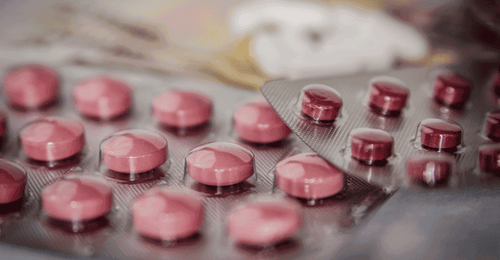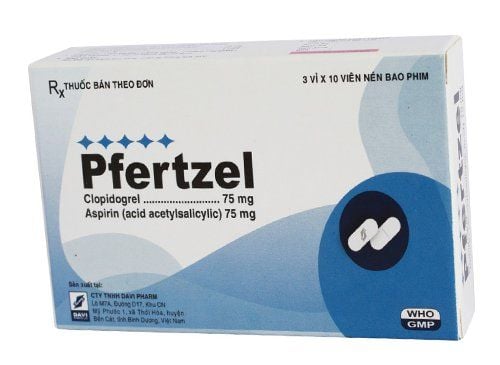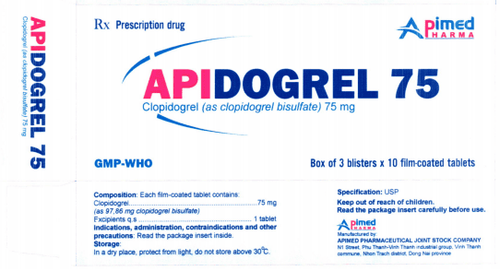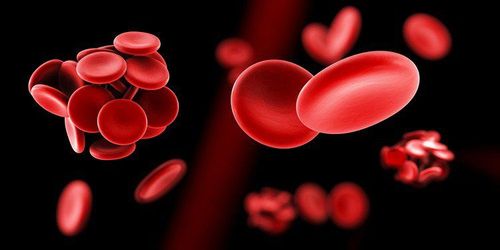This is an automatically translated article.
Clocardigel 75 is manufactured and registered by OPV Pharmaceutical Joint Stock Company, belongs to the group of drugs acting on blood, this is a prescription drug. So what is the use of Clocardigel 75, let's find out the article below to get more information about Clocardigel.
1. What is Clocardigel 75?
Clocardigel drug has the main ingredient containing the active ingredient Clopidogrel (as Clopidogrel bisulphate) with a content of 75 mg, made in the form of film-coated tablets, presented in a box of 3 blisters, 1 blister with 10 tablets or a box of 4 blister, each blister contains 7 tablets.
2. Indications of Clocardigel 75
Clocardigel is indicated for use in the following cases:
Indication for primary prevention of thromboembolic disorders such as stroke, myocardial infarction, peripheral artery disease. Indicated for use in cases of helping to reduce atherosclerotic events such as stroke, myocardial infarction, vascular death in patients with recent myocardial infarction or stroke, peripheral artery disease vi has just been confirmed.
3. Usage and dosage of Clocardigel 75
3.1. How to use Clocardigel 75 Clocardigel is produced in the form of tablets, so patients can use it orally, the time of taking the drug does not depend on the time of meals.
3.2. Dosage of Clocardigel 75 In stroke, recent myocardial infarction or recently confirmed peripheral arterial disease: the recommended dose is 75 mg (equivalent to 1 Clocardigel tablet), once daily. In acute coronary syndromes: In the absence of ST-segment elevation (non-Q-wave myocardial infarction, unstable angina), Clocardigel should be administered at an initial dose of 300 mg and then continued. at a dose of 75 mg once daily. Combination with Aspirin (dose from 75 mg to 325 mg, once daily) should be initiated and continued in combination with Clocardigel. In the case of ST-segment elevation, the recommended dose of Clocardigel is 75 mg once daily in combination with aspirin and thrombolytic agents. Patients with a history of atherosclerosis: 75 mg (equivalent to 1 Clocardigel tablet) daily. In patients with renal impairment or the elderly, no dose adjustment is required. 3.3. Overdose and treatment of overdose In the case of an overdose of the drug, the patient may experience symptoms such as: abnormal bleeding, bruising. If the patient cannot breathe or is comatose, they need to be taken to the emergency room immediately.
4. Undesirable effects of Clocardigel 75
Clocardigel is easily tolerated, but during use, patients may still experience the following undesirable effects:
Common side effects: gastrointestinal disturbances (abdominal pain, nausea, dyspepsia, diarrhea) and skin allergies (pruritus, erythema). Less common side effects such as nosebleeds, chest tightness. Rare side effects: peptic ulcer, gastrointestinal bleeding, thrombocytopenia, neutropenia, thrombocytopenic purpura, severe agranulocytosis, aplastic anemia, loss of taste, kidney disease such as nephritic syndrome, acute arthritis. It is recommended that patients during the use of Clocardigel, if experiencing any unusual symptoms, should immediately report to the doctor for treatment support.
5. Clocardigel drug interactions 75
The risk of bleeding may be increased with concomitant use of Clocardigel and Aspirin, Heparin, Warfarin. Accordingly, care should be taken when using these drugs together. NSAIDs: Concomitant administration of Clocardigel and naproxen may increase the potential for gastrointestinal bleeding. The drug Clocardigel inhibits Cytochrome P450, so it will affect the metabolism of drugs metabolised by the Cytochrome P450 system: tamoxifen, phenytoin, warfarin, tolbutamide, fluvastatin, torsemide and many other NSAIDs. Concomitant administration of CYP2C19 inhibitors such as: esomeprazole, omeprazole, moclobemide, fluoxetine, fluconazole, fluvoxamine, moclobemide, cimetidine, ticlopidine, voriconazole, ciprofloxacin, oxcarbazepine, carbamazepine and chloramphenicol should be used with caution. reduce the active metabolite of Clocardigel. The active metabolites of Clocardigel are reduced in plasma concentrations leading to a decrease in the antiplatelet effect of Clocardigel when administered concomitantly with antifungal agents (eg, Ketoconazole). Clocardigel reduces the metabolism of Bupropion to its active metabolites. There is an increased risk of rhabdomyolysis when Clocardigel is taken with other Satin drugs such as lovastatin, atorvastatin, and simvastatin.
6. Note when using Clocardigel 75
6.1. Contraindications of Clocardigel 75 Clocardigel is not contraindicated in the following subjects:
Patients with hypersensitivity to Clopidogrel or any of the excipients contained in Clocardigel. The patient is suffering from diseases of intracranial hemorrhage, gastrointestinal ulcer, severe liver failure. Not for use by pregnant women and nursing mothers. 6.2. Precautions when using Clocardigel 75 Care should be taken in taking the patient's medical history as well as the medical conditions that the patient has before prescribing Clocardigel treatment such as: bleeding in the brain, bleeding ulcers in the gastric mucosa stomach or small intestine, recent injury or any factors that cause severe bleeding, or a history of medical conditions such as stomach ulcers, liver or kidney disease, eye problems. Since Clocardigel increases the risk of bleeding, care should be taken not to injure the body during treatment with Clocardigel. Clocardigel should not be used for the first few days after an acute myocardial infarction. In patients undergoing surgery, Clocardigel should be discontinued 5 days prior to surgery. Clocardigel does not affect the ability to drive or use machines.
7. Store Clocardigel 75
Store Clocardigel medicine in a cool, dry place, avoid direct sunlight or high temperature, because of the risk of changing the substances in Clocardigel, room temperature is the right temperature for preservation. manage. Medicines should be kept out of reach of children to avoid misuse. Before use, carefully read the instructions for use, expiry date, avoid using expired or moldy, discolored, watery products. The drug Clocardigel contains the active ingredient Clopidogrel, which is indicated for the treatment of thrombosis, cardiovascular disease, and stroke. To ensure the effectiveness of treatment and avoid unwanted side effects, patients need to strictly follow the instructions of the doctor, professional pharmacist.
Follow Vinmec International General Hospital website to get more health, nutrition and beauty information to protect the health of yourself and your loved ones in your family.













